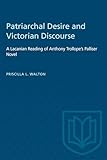Patriarchal Desire and Victorian Discourse : A Lacanian Reading of Anthony Trollope's Palliser Novel / Priscilla Walton.
Material type: TextSeries: HeritagePublisher: Toronto : University of Toronto Press, [1995]Copyright date: ©1995Description: 1 online resource (192 p.)Content type:
TextSeries: HeritagePublisher: Toronto : University of Toronto Press, [1995]Copyright date: ©1995Description: 1 online resource (192 p.)Content type: - 9781487585747
- 9781487574482
- 823/.8 20
- PR5683.W6 W35 1995eb
- online - DeGruyter
| Item type | Current library | Call number | URL | Status | Notes | Barcode | |
|---|---|---|---|---|---|---|---|
 eBook
eBook
|
Biblioteca "Angelicum" Pont. Univ. S.Tommaso d'Aquino Nuvola online | online - DeGruyter (Browse shelf(Opens below)) | Online access | Not for loan (Accesso limitato) | Accesso per gli utenti autorizzati / Access for authorized users | (dgr)9781487574482 |
Browsing Biblioteca "Angelicum" Pont. Univ. S.Tommaso d'Aquino shelves, Shelving location: Nuvola online Close shelf browser (Hides shelf browser)

|

|

|

|

|

|

|
||
| online - DeGruyter Dene Nation : The colony within / | online - DeGruyter Options for a New Canada / | online - DeGruyter Argument Structure : A Pragmatic Theory / | online - DeGruyter Patriarchal Desire and Victorian Discourse : A Lacanian Reading of Anthony Trollope's Palliser Novel / | online - DeGruyter The Disruption of the Feminine in Henry James / | online - DeGruyter The Improvement of Mankind : The Social and Political Thought of John Stuart Mill / | online - DeGruyter Old English Literature : A Select Bibliography / |
restricted access online access with authorization star
http://purl.org/coar/access_right/c_16ec
While there have been studies examining Trollope from a feminist perspective, very little work has taken into consideration the questions raised by contemporary critical theory. Patriarchal Desire and Victorian Discourse is unique in that it links feminist analysis with psychoanalytic theory, and brings both to bear on an examination of Trollope's writings. The feminist Lacanian analysis employed by Priscilla L. Walton offers a new perspective on the dominant Victorian cultural dynamic. She explains how the works serve as complex and ultimately double-edged exemplars of patriarchal desire and masculinist discourse. For most of his life Trollope sought to gain acceptance to a privileged social group, from which he was initially excluded as a result of his class. Walton begins with his situation as presents it in An Autobiography in order to place the author historically, as a man whose social position granted him a useful vantage point from which to comment on the implications of the hierarchical structure of Victorian culture. Walton then explores the six novels which comprise the Palliser series, a series devoted to the depiction of Victorian political life. She focuses on the portrayal of women in these texts, and explores the contradictions apparent in their characterizations. As feminist critics have argued, Trollope dramatizes strong and frequently sympathetic female character who are, nonetheless, ultimately thwarted in their desire for independence. Walton contends that Trollope's treatment of female characters reflect the ways in which conventional social orders rest upon the objectification of women in order to affirm a singular construction of male subjectivity. Informed by arguments drawn primarily from feminist psychoanalytic theory, but also from post-colonial, narrative, and deconstructive scholarship, Walton's readings demonstrate how Trollope's Victorian discourse provides insights into current attempts to disenfranchise women. She then illustrates how such writings can serve as a means of consolidating female strength through their covert revelation of the importance of women's conventional position to traditional social structures. Walton, therefore, offers an alternative perspective on Trollope's fiction, and by extension, that of other Victorian novelists, and, as she does so, she contributes to the ongoing theoretical dialogue surrounding discursive agency and feminist politics.
Mode of access: Internet via World Wide Web.
In English.
Description based on online resource; title from PDF title page (publisher's Web site, viewed 01. Nov 2023)


